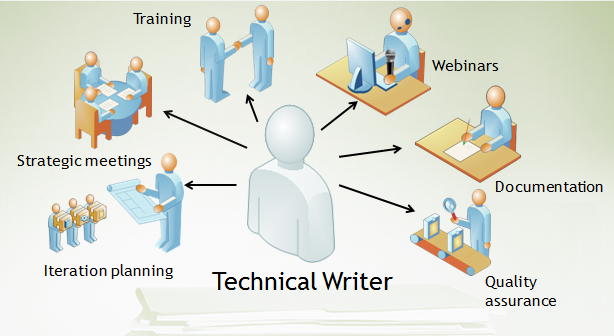Technical writing is a growing field with abundant opportunities for skilled professionals. As technology continues to evolve, the demand for clear, concise, and accurate documentation rises. From software user manuals to API documentation, technical writing plays a critical role in ensuring users understand complex products and systems. This blog post delves into the exciting world of technical writing, exploring the opportunities it offers, the skills needed, and how to break into this rewarding career.
Understanding Technical Writing: The Core of Documenting Technology
Technical writing is a specialized form of communication that focuses on presenting complex information in a clear and understandable way. Unlike other forms of writing, technical writing demands precision, simplicity, and structure. Whether it’s creating a user guide for a new software tool or writing a manual for industrial machinery, the goal is the same: to make complicated concepts easy to understand for the target audience.
The demand for technical writing professionals has surged in recent years, especially as businesses and industries rely on advanced technology to streamline operations and improve their products. Companies need technical writers to document their technology, whether for internal use or for customers who need instructions on how to operate a system, troubleshoot issues, or maximize the functionality of a product. Therefore, the need for quality technical documentation is only set to increase as innovation continues to grow across sectors.
The Different Types of Technical Writing Projects
One of the exciting aspects of technical writing is the diversity of projects that professionals can work on. From high-level technical documentation to end-user guides, there is a wide range of opportunities available. Below are some of the common types of technical writing projects:
1. Software Documentation
Software documentation is perhaps the most prominent form of technical writing. It includes everything from installation guides, user manuals, FAQs, and API documentation. Software developers and engineers often rely on technical writers to document the features, functions, and capabilities of their software products. These documents need to be accurate, easy to navigate, and updated regularly to reflect any new features or bug fixes.
Software documentation can also include release notes, system configuration guides, and troubleshooting instructions. The role of the technical writer is to break down complex programming languages and code into easily digestible content that users can follow, regardless of their technical expertise.
2. Hardware Documentation
In addition to software, hardware companies also require detailed documentation to help users set up, configure, and troubleshoot their devices. This could include user manuals, assembly instructions, maintenance guides, and technical specifications. Hardware documentation is critical for both consumer products, like smartphones and computers, and industrial machinery.
Creating effective hardware documentation often involves working closely with engineers to ensure that every detail is accurate, whether it’s describing a new feature or providing troubleshooting steps. Additionally, the content must be structured clearly to ensure users can quickly find the information they need without confusion.
3. API Documentation
API (Application Programming Interface) documentation is another key area within technical writing. APIs enable different software applications to communicate with one another, and proper documentation is essential to help developers integrate and use APIs effectively. API documentation is often highly technical, providing code examples, usage instructions, and detailed explanations of how the API works.
Technical writers who specialize in API documentation must be familiar with coding languages and software architecture to accurately document complex systems. This is one of the most specialized types of technical writing and requires a deep understanding of programming concepts.
Key Skills Required for Technical Writing
To succeed in technical writing, it is important to have a mix of both writing and technical skills. While strong writing skills are essential, technical writers must also be able to understand the subject matter they are documenting. Here are some of the key skills required to excel in this field:
1. Excellent Writing Abilities
The foundation of any technical writing career is the ability to communicate clearly and effectively. Technical writers must be able to present complex concepts in a way that is easily understood by the target audience. Whether it’s writing step-by-step instructions or creating detailed product manuals, the ability to write concisely and accurately is critical.
Technical writers must also be familiar with various writing styles, such as APA or Chicago style, as well as industry-specific writing standards. Clarity, consistency, and correctness are key factors in creating high-quality technical documentation.
2. Technical Proficiency
While you don’t need to be an engineer or software developer to become a technical writer, having a basic understanding of the technology you are documenting is highly beneficial. Depending on the industry you work in, you may need to learn specific technical terms, coding languages, or hardware components. The more you understand about the subject matter, the easier it will be to produce clear and accurate documentation.
3. Attention to Detail
Accuracy is paramount in technical writing. A small mistake or miscommunication can lead to confusion or errors for users. Whether you are documenting software functionality, product features, or technical specifications, it is essential to pay attention to every detail. A minor error in documentation could impact how users interact with the product or system, leading to frustration or incorrect usage.
4. Strong Research Skills
Technical writers often need to conduct thorough research to fully understand the products or systems they are documenting. This may involve reviewing existing documentation, speaking with subject matter experts, or testing the product firsthand. Research skills are essential for ensuring that the documentation is not only accurate but also comprehensive.
The Growing Demand for Technical Writers

As technology becomes more sophisticated, the need for technical writers is only going to increase. According to the U.S. Bureau of Labor Statistics, the demand for technical writers is projected to grow 7% from 2020 to 2030, which is faster than the average for all occupations. This growth is driven by the continued advancement of technology across industries like software development, healthcare, manufacturing, and engineering.
The rise of digital platforms, cloud computing, and the Internet of Things (IoT) has made it more important than ever to create clear and concise documentation that can be easily accessed and understood by users. Companies that are developing new technologies or products need skilled writers to ensure their customers can easily interact with and benefit from these innovations.
How to Start a Career in Technical Writing
If you are interested in pursuing a career in technical writing, there are several steps you can take to get started. Here are some tips to help you break into the field:
1. Develop Writing and Technical Skills
Start by honing your writing skills. Practice writing about different topics in a clear and concise manner. If you are new to technical writing, consider taking courses in technical communication or specialized areas like software documentation or API writing. Building a strong portfolio of writing samples is essential when applying for technical writing positions.
Additionally, take the time to learn about the technologies you are interested in documenting. Whether it’s understanding software development processes, learning about specific hardware components, or gaining familiarity with industry terminology, the more knowledge you have, the better equipped you will be to write for technical audiences.
2. Build a Portfolio
As a technical writer, your portfolio is your most important asset. Create a collection of writing samples that showcase your ability to break down complex information into clear, readable content. If you don’t have prior experience, consider taking on freelance projects, volunteering, or documenting open-source software to build your portfolio.
3. Gain Experience
Gaining experience is key to succeeding in technical writing. Many companies offer internships or entry-level positions that allow you to learn on the job while gaining exposure to different types of documentation. Freelance work is another great way to gain experience and build a diverse portfolio.
4. Stay Updated
Finally, technical writing is a field that evolves along with technology. Stay updated on industry trends, new tools, and emerging technologies to ensure your skills remain relevant. Attend conferences, join online communities, and subscribe to industry blogs to keep up with the latest developments in technical writing.
Conclusion: The Bright Future of Technical Writing
Technical writing offers a wide range of opportunities for individuals with the right skills and interests. Whether you’re documenting software, hardware, or specialized technical concepts, the demand for clear and accurate documentation is only increasing as technology continues to advance. With the right education, experience, and attention to detail, a career in technical writing can be both fulfilling and financially rewarding.
